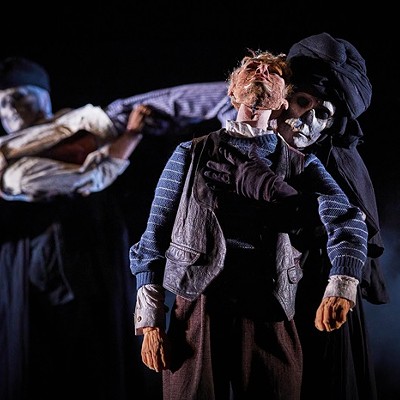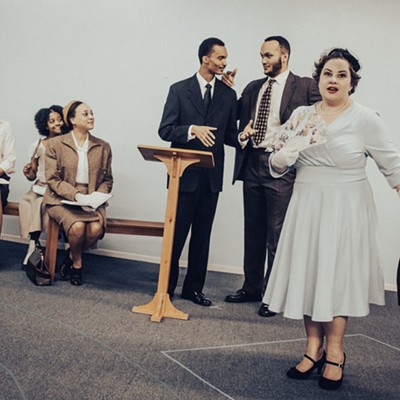If you can't talk The Grapes of Wrath without talking politics, neither can you discuss the opera version of Steinbeck's classic with its creators without talking president-elect. Especially on Nov. 5, 2008.
Unsurprisingly, considering how faithfully the opera translates the novel's populist critique of society, composer Ricky Ian Gordon and librettist Michael Korrie backed Obama. Both men, neighbors in New York City, volunteered on the campaign; Gordon says he played piano at an Obama fund-raiser that netted $150,000.
The ironies of using perhaps our most well-heeled art form to dramatize the plight of Depression-era Okie migrants are obvious. All the more so because the show -- opening here on Sat., Nov. 15 -- is huge by the minimalist norms of contemporary opera: full orchestra, big chorus, 19 soloists. "It's like a big fat Broadway show," says Gordon, the Carnegie Mellon alum (class of '80) and award-winning composer who is in town during rehearsals.
But it was Gordon's lively, accessible style that attracted the Steinbeck estate, which -- despite the 1940 Henry Fonda film and a more recent stage adaptation -- had long rebuffed requests to make a Grapes opera. Pittsburgh Opera co-produced the show with the Minnesota Opera (where it world-premiered in January 2007) and the Utah Symphony & Opera.
Grapes follows the Joad family, sharecroppers who flee Oklahoma's Dust Bowl for the false promise of California, where big business and the law collude against the poor. Korrie (a Tony-winner for Grey Gardens) adapted Steinbeck's inherently operatic three-act structure (exodus/wilderness/flood); the eclectic Gordon drew on Americana incorporating blues and Appalachian music, Gershwin and Copland.
The show was widely praised. New Yorker critic Alex Ross noted Gordon's "beautifully turned genre pieces" and "powerful choral numbers." Despite a four-hour running time, Los Angeles Times' Mark Swed wrote, "I would have gladly returned for more."
The Pittsburgh production, trimmed for budget reasons to three-and-a-half hours (with two intermissions), features Craig Verm as Tom Joad and Metropolitan Opera mezzo-soprano Elizabeth Bishop as Ma Joad; Richard Buckley conducts.
While Gordon's past work wasn't explicitly political, he cites, alongside Porgy and Bess, influences like Marc Blitzstein's 1938 pro-labor musical The Cradle Will Rock. And Korrie's credits include Harvey Milk, about the slain San Francisco politician.
Current events have echoed the project's themes almost since its inception. In 2005, ABC's 20/20 borrowed a newly written Grapes song about migrants to score footage of Katrina refugees escaping New Orleans. There's also a scene about building a fence to keep out migrant workers.
And lately, with mortgage foreclosures rampant, bureaucrats, bankers and politicians are all singing the Gordon/Korrie number "Not My Fault." "I didn't know the country was going to turn into The Grapes of Wrath this year," quips Korrie, by phone from New York.
"The Dust Bowl was a man-made disaster based on greed," says Gordon. "Now we're looking at the whole world being a man-made disaster based on greed."
Korrie calls opera, heavily subsidized by corporate funders, "the last bastion of Republicanism."
"That's why I like doing The Grapes of Wrath in an opera house," he says. "It really is a bit of chutzpah ... [Grapes of Wrath is] about the disparities, the hypocrisies of the American system."
But Gordon says the morning after Election Day looked a little brighter.
"I thought, 'It's a world that's suddenly hope-filled. The Grapes of Wrath is gonna be different because there's hope."
Pittsburgh Opera presents The Grapes of Wrath 8 p.m. Sat., Nov. 15; 7 p.m. Tue., Nov. 18; 8 p.m. Fri., Nov. 21; and 2 p.m. Sun., Nov. 23. Benedum Center, 719 Penn Ave., Downtown. $16-140. 412-456-6666 or www.pittsburghopera.org














